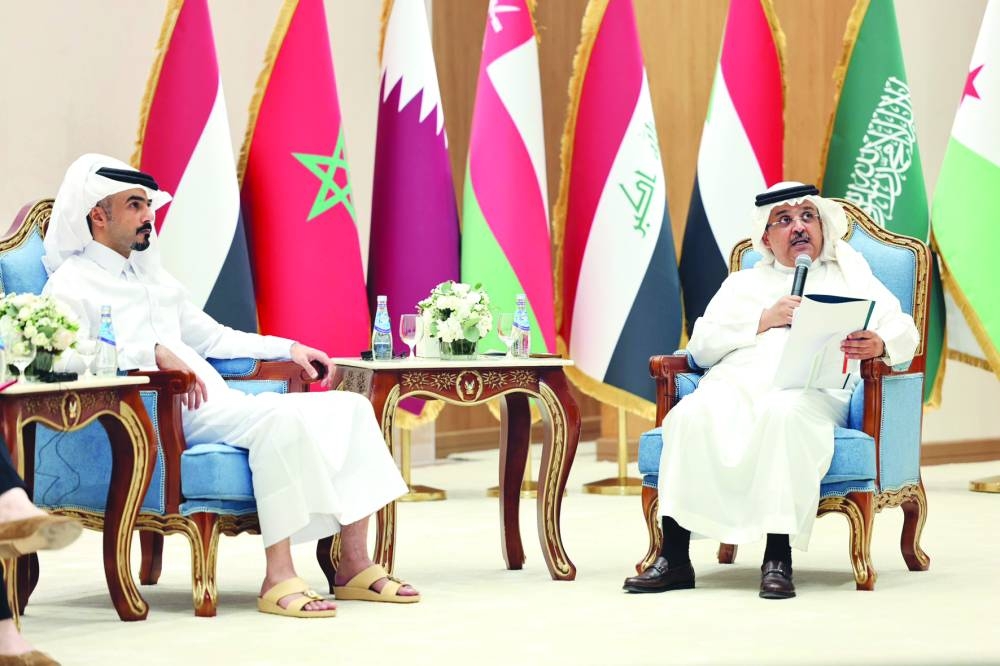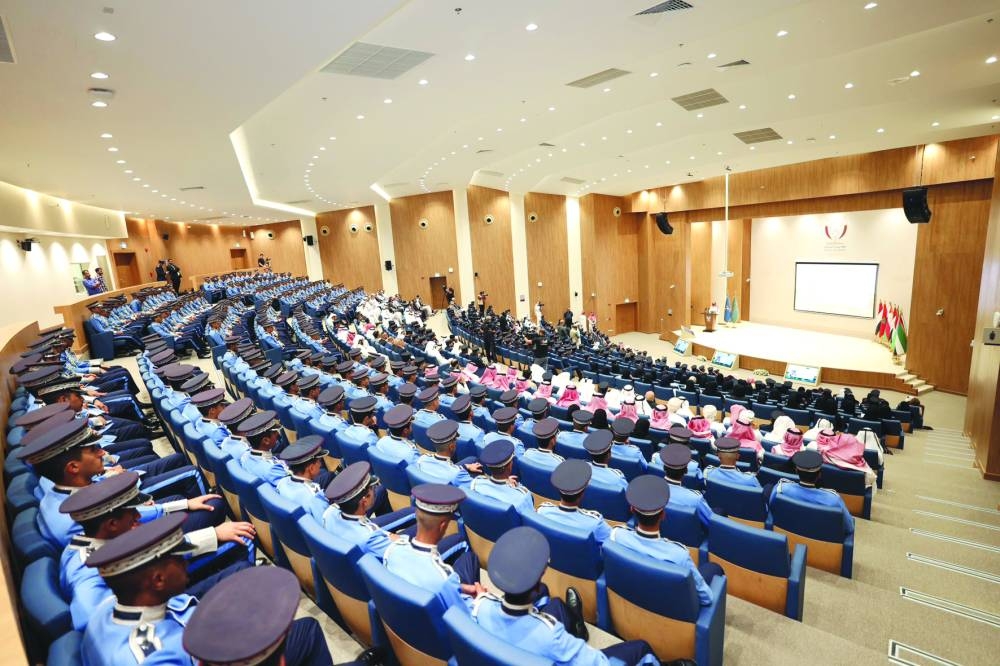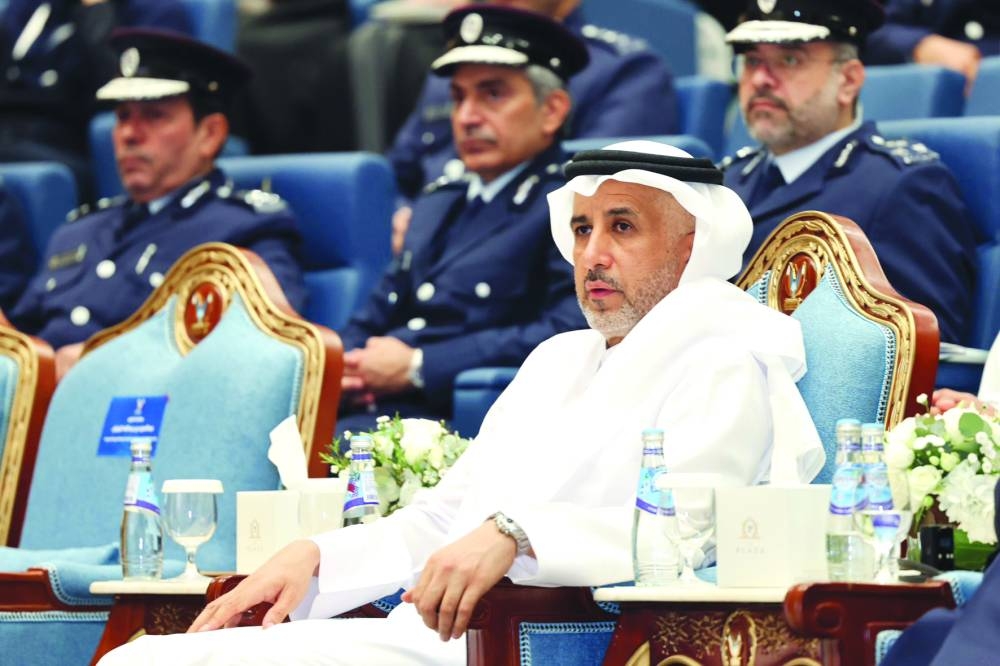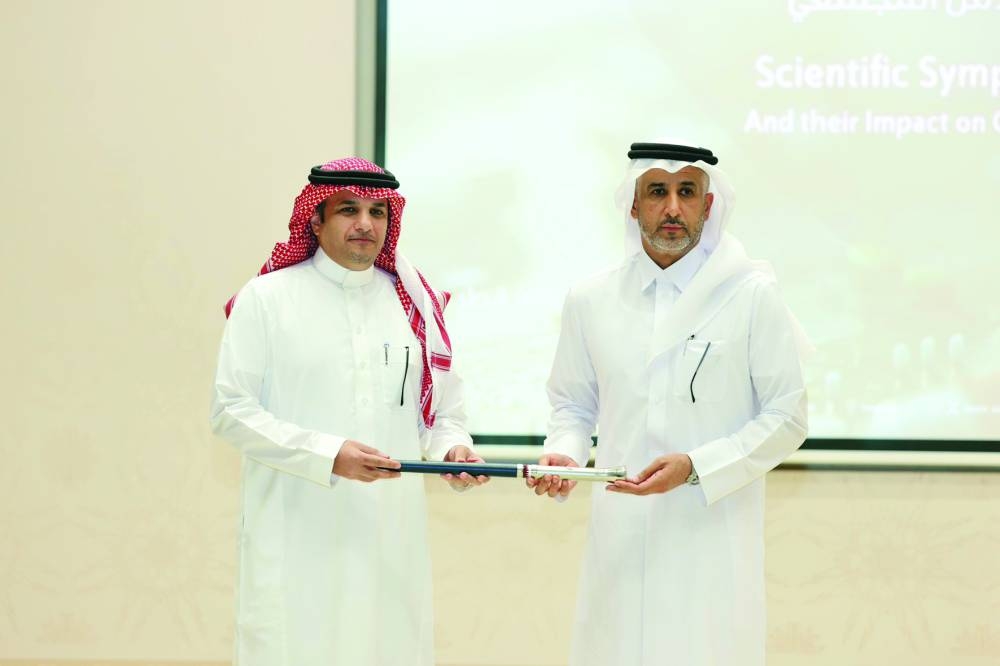Under the patronage of HE the Minister of Interior and Commander of the Internal Security Force (Lekhwiya) Sheikh Khalifa bin Hamad bin Khalifa al-Thani, the seminar on "Drugs and Their Impact on Societal Security" commenced on Sunday.
The three-day seminar is organised by the Ministry of Interior (MOI), represented by the Centre for Security Research and Studies at the Police Academy, in collaboration with Saudi Arabia’s Naif Arab University for Security Sciences and the GCC Criminal Information Centre to Combat Drugs.
The opening session at the Police Academy was attended by HE the Minister of State for Interior Affairs Sheikh Abdulaziz bin Faisal bin Mohammed al-Thani, Naif Arab University for Security Sciences (NAUSS) president Dr Abdulmajeed bin Abdullah Albanyan, and a number of MoI senior officials and specialists and various concerned entities and experts.
The seminar discusses various topics and axes on drugs and their impact on societal security, in addition to identifying the reality and factors of drug abuse in Arab society, successful scientific methods for preventing and combating this scourge, and formulating a unified Arab strategy to enhance security and judicial co-operation to confront it.
It also highlights the role of civil society institutions in reducing the spread of drugs.
In his speech during the seminar, Police Academy president Brigadier-General Abdul Rahman Majid al-Sulaiti said that the seminar comes within the framework of the MoI's commitment and contributions at the regional and international levels to enhance security efforts and integration with relevant international institutions to combat drugs.
He added that the seminar represents a practical model of serious co-operation and active security co-ordination in the field of combating drugs.
Brigadier-General al-Sulaiti said that the Police Academy looks forward to this seminar contributing to highlighting the latest preventative and therapeutic interventions and having a positive impact in achieving the desired goals of this co-operation, as well as being a scientific platform for launching effective recommendations and qualitative programmes that have a positive role in safeguarding societies.
Dr Albanyan warned of the destructive effects of drugs, highlighting that they target young people who are the pillars of the future, are linked to the spread of crime that cause great harm to the family, and result in serious security, economic, and environmental consequences for societies, in addition to their connection to corruption and illicit financial flows.
He indicated that studies issued by the most important international institutions confirm that preventative and joint solutions between countries based on evidence and proof are successful solutions and that enhancing international co-operation and exchanging information effectively and quickly is a decisive factor in confronting it.
Dr Albanyan said that one of the most important developments internationally in the illicit drug trafficking market was the significant increase in seizures of manufactured drugs.
He stressed that the increasing complexities of illicit drug trafficking, terrorist groups, organised crime, and related crimes, in addition to technical developments, especially those related to artificial intelligence (AI), require trained human capabilities and decision-making and data-based procedures and studies to successfully confront them.
The NAUSS official added that in recognition of the role played by the university in the confrontation system, the Regional Expertise Centre for Combating Drugs and Crime (REC-CDC) was established at the university's headquarters in partnership with the United Nations Office on Drugs and Crime (UNODC), reviewing the postgraduate programmes offered by the university.
Following the opening session, HE Sheikh Abdulaziz honoured Dr Albanyan and opened the exhibition accompanying the seminar, in which representatives from a number of MoI departments and the NAUSS participated.
The first day of the seminar saw the presentation of several papers on anti-drug experiences from Qatar, France, and Egypt.
The director-general of drug enforcement at the Ministry of Interior, Staff Colonel Rashid Saree al-Kaabi, presented a paper titled *The Role of Civil Society Institutions in Combating Drug Abuse and Its Impact on Society – Strategies and Challenges: A Case Study on Qatar.
He highlighted Qatar's anti-drug strategy, the role of civil society in drug prevention, challenges, and the joint preventative programmes and activities conducted with civil society institutions.
Dr Dominique Luciani Mian, a faculty member at the department of private law and criminal justice at France’s University of Lyon, discussed *The French Experience in Combating Drugs: Reality and Prospects.
She reviewed the efforts of French security agencies in fighting drug abuse, emphasising deterrence and the need to grant these agencies more powers.
Major-General Dr Hisham al-Zoghbi, former assistant minister of interior for the anti-narcotics, weapons, and ammunition sector in Egypt, presented a paper on *Towards a Comprehensive Strategy to Combat Drug and Psychoactive Substance Crimes, in which he shed light on the global situation and proposed a modern security strategy for combating drugs.
The seminar included a presentation by Dr Khalifa Jaham al-Kuwari, the assistant director-general of the Naufar Centre, on *Strategies for Establishing a National and Regional Model for Combating Drug Addiction in the Gulf Co-operation Council (GCC) Countries: A Practitioners' Perspective.
Dr Iman Rajab, director of the Regional Centre for Combating Drugs and Crime at the NAUSS, contributed a paper on *Drug Prevention Programs and Policies: Between Reality and Expectations.
Chief executive of Saudi Arabia’s National Committee for Combating Drugs (Nebras), Dr Sami bin Khalid al-Hamoud, focused on the role of family skills in addiction prevention.
The final paper of the day was presented by Ion Graba from Romania’s Combating Organised Crime Directorate, addressing co-operation in security and judicial fields to tackle drug-related challenges.
The first day of the seminar also witnessed the display of a documentary about the NAUSS and the Police Academy.
The film highlighted the extent of co-operation between the two parties and the mutual activities and visits to achieve the desired goals of the two institutions.




